Editor’s note: In the first three installments of this series, Larry Mullins explained how Furniture World readers can identify and develop productive and mutually beneficial relationships with the toughest and most elusive personality types. Read on to find out how salespeople in your organization can increase sales performance by questioning some of the conventional assumptions they hold about success and selling furniture. For those of you who missed the first three installments, please visit.
Salespeople who achieve victorious careers in selling approach their business lives according to different assumptions than mediocre salespeople.
This article will explore the five conventional assumptions that guide most sales associates. These are ideas that hold them back from achieving greatness. Before we begin, let’s drill down into the old “think outside the box” idea. You have likely heard of or seen this puzzle (illustration #1). The object of the game is to connect the nine circles with four straight lines, without lifting your pencil or pen from the paper. Please give it a try before you continue reading.

Did you succeed? To solve the puzzle you must go out of the area that is bounded by the circles. Yet, very few people discover the solution without help. Almost everyone stays within the circle area, even though there is no rule that restricts them to this area. Try as they may, no matter how patient they are, or how hard they exert themselves, this self-imposed rule will cause people to engage in a game without end. Many people, really most people, live their lives restricted by similar self-imposed assumptions. And, worse than this, they silently believe the assumptions establish rules that are real and cannot be changed.
“It obviously makes a difference whether we consider ourselves as pawns in a game whose rules we call reality or as players of the game who know that the rules are real only to the extent that we have created them, and we can change them.” - Dr. Paul Watzlawick

I first saw this puzzle many years ago in a book by Professor Watzlawick with the title: “Change: The Principles of Problem Formation and Problem Resolution.” The professor’s four line solution can be found in Illustration #2 (above):
But let’s stretch your mind further, and go beyond Watzlawick. Imagine connecting the circles with just THREE lines in the same manner. Is it possible? Yes, unless you again impose a rule on yourself that makes it impossible, such as that the lines must pass through the center of each circle.
Naturally, circles have dimension. So the new solution works. But let us give you another “impossible” task - can you connect all the circles with a single pencil line in ONE stroke?
You can if you had a pencil with a giant, flat piece of lead in it!
In much the same manner of the circle game, the limitations and restrictions we live by are self-imposed. Most salespeople postulate into existence false assumptions that generate timidness, lack of resolution, and defeat. In this article I will show you five “games without end” that nearly all salespeople play. Each game is destructive and restrictive. Great salespeople drill down deeper and deeper and change the assumptions and the rules, so they can break out into fresh possibilities. The information you’ll read was gathered over the last 35 years. The solutions have been tested in real life, and they work.
THE DRIFT DELUSION ASSUMPTION

This assumption results in a game of Fear and Procrastination, a game without end. It goes like this:
“I am keeping my talent, my real enthusiasm, and my sincere commitment on hold until I discover what it is that I really want to do, or until the heavens open up and God speaks to direct me to some noble endeavor of supreme magnitude.”
This is a false assumption that destroys more talent and potential and keeps more people asleep than any other belief I know. The process of holding back and avoiding commitment prevents you from interacting with the very dynamics that are necessary to help you create meaningful objectives. When you keep your potentials in reserve, they will decay and eventually they will disappear altogether. Once gone, these potentials are gone forever.
You might say: “Oh, I would like to have a goal to believe in, but I just don’t know what I really want to do.” But this is not true. You DO know what you want to achieve. If nothing else, you know you want to find your goal! This in itself is a goal, and a very difficult one. You must work very hard to achieve it. Yes, you do know what you want. You want to find your purpose. You’ve wanted to do this for a long time. You simply have not worked with all your resolve and dedication long enough to find it. If you can’t really work hard to discover your goal in life, what makes you think you’d work hard if you knew what it was you “wanted to do?” So less talented salespersons may outperform you. They may have very limited and selfish objectives, but these goals are probably clearly defined, and they are acting to achieve them. An individual who believes deeply in a foolish or unworthy idea is stronger than an individual who half believes in some noble idea. You need to replace the Drift Delusion with a whole new set of rules, a fresh and nourishing concept, the Next-Step Strategy.
NEXT-STEP STRATEGY: “TODAY I will exert the very best there is in me to move toward the accomplishment of my own personal NEXT-STEP. This is the constructive step I have known for a long time I should take, but continue to procrastinate and fail to act upon. Today I will begin movement toward that step so that the NEXT Next-Step can appear.”

The Next-Step Strategy works, because even though you may not have long-range completely-clear goals, you do know what your next step should be. You’ve known it for some time. If you are honest with yourself, you will admit that you do know of a step you should take, one that will take you in the direction you want to go. It may be a very modest step, but that does not matter. What matters is direction and movement.
The great psychiatrist Alfred Adler had a favorite saying: “Trust only movement.” Often we can be confused by words and theories. But movement is an infallible gauge. Movement feels good. When you are moving in the right direction you feel buoyant, confident, and powerful. The instant you stop, when you become afraid or dependent, the world turns grey. Movement is an unmistakable gauge; you can feel it. Each day, moment by moment, you are making decisions to go back toward safety or forward toward growth. It could be that you will decide your next-step is to sit down and write down what you expect to achieve by this time next year. (This single action of writing down your goals would immediately put you in the top ten percent of Americans! Only one individual in ten writes down goals!)
THE MESSIANIC MISCONCEPTION ASSUMPTION
“I can pursue my main goal and still have time and energy to correct the methods and attitudes of the individuals and organizations with which I must deal.”

This idea is wrong. Some of the people who practice the Messianic Misconception accomplish things, but they never come near reaching their full potential.
“Use things the way they are. Unless your specific objective is to change the status quo, do not attempt to change the basic makeup of people, organizations, mores, policies, etc. Operate within existing structures. Instead of, for example, fighting bureaucracy, learn to use it for cover. If a man is an egoist, you won’t be able to change him, but you will be able to communicate with him through his ego,” wrote W. A. Mambert.
Many gifted people suffer from the Messianic Misconception. These people pursue “burning issues” and generally clutter their lives up with trivia. The result is a game without end. There isn’t any time left to do the real work. You can avoid the trap of the Messianic Misconception if you apply the proper cure. It has various names, but I call it the Main-Issue Maxim.
THE MAIN-ISSUE MAXIM: Today I will exert all my effort to focus upon the MAIN ISSUE of my life, my NEXT-STEP, and will shun all ego food and ignore all unrelated issues. I will use existing systems, people and institutions to accomplish my objectives.”
Now, the importance of having a clear, defined goal is obvious. Otherwise the Main-Issue Maxim won’t work. Above all, write down a goal that you really want, not one you think you should want. Your heart and your head must be striving for the same purpose. There is no great secret of success that transcends this simple truth. Make the desire of your mind the desire of your heart.
The Main-Issue Maxim is especially valuable in freeing you from games without end when you are at work. You’ll find the most aggravating “problems” are those that have no bearing on your own personal main issue. They are usually someone else’s main issue, or simply a bit of ego food you could really live without.
If you could see into the future and knew you were going toward an inevitable victory, if you could know for certain success would crown your efforts, the Main-Issue Maxim would be easy to apply.
THE ASSUMPTION OF VICTIMHOOD
Nearly every human being believes they are a victim of forces or circumstances beyond their control, circumstances that shape their lives. Not only the simple, everyday folks, but also the famous and the infamous as well. Even the toughest people, when defeated and forced to the brink of disaster, find great solace in the wine of self-pity. A single sip of this brew can numb the mind for days.

Some people are absolutely brilliant at living in perpetual martyrdom and victimhood. No matter what the situation, it is soon twisted until it can be made to justify their own chronic indignant rage or hurt feelings. Few people uncompromisingly accept the responsibility for themselves and their lives. Thus was created the most popular loser’s game in the world:
“I am not a free human being; I am a victim. I live in the environment I do, I am where I am in life, I associate with the people I do, have the attitudes I do, because of circumstances beyond my control. I am dependent upon the goodwill of others (which is not dependable!) as well as pure luck to supply the ‘goodies’ in life I want and need.”
People would not make this declaration out loud, of course, but they ACT as though this philosophy ruled their lives. The unconscious dependence upon others is a subtle, destructive factor. The Assumption of Victimhood postulates the responsibility of other people for your own problems and your unhappiness. This martyrdom posture implies that you are helpless to create and control your own environment, and that you are a noble victim of evil, selfish people. Responsibility, and thus authority over your life, are handed over to others by default, in the hope that they will be nice enough to feel sorry for you, or be intimidated by your outrage, and take action to help you out.
The alternative to martyrdom is the irrevocable decision to accept self-responsibility and self-initiative. This decision rejects forever your dependence upon the goodwill of others for the “goodies” of life, including approval, love, esteem, and power. The Resolution of Responsibility is a declaration of freedom from the self-pitying narcotic of martyrdom:
RESOLUTION OF RESPONSIBILITY: “I am a free human being, I am not a victim. I live in the environment I do, I am where I am in life, I associate with the people I do, have the attitudes I do, because of circumstances I have created or permitted to exist. I am capable of achieving whatever I can intelligently determine to achieve, and I am responsible for my situation. No one can rescue me, but mighty forces will come to my aid when I begin to make growth decisions and complete them through positive ACTION.”
THE ASSUMPTION OF MEDIOCRITY
Abraham Maslow called this assumption the “Jonah Complex.” He determined that most people, like the Biblical Jonah, strive to escape from their personal destinies. They decide to do something, work hard, get close to success, and then give up. Most people start telling themselves: “Who am I to think I could do such and such.” Yet every great salesperson I have known embraced a remarkable assumption: They were conscious of a victorious career at playing the game of life itself. And they based this assumption on very different benchmarks than most of us use. Most of us compare ourselves to others. Winners strive to surpass their own limitations. When someone does this, it makes the rest of us uncomfortable. We want people to remain their mediocre selves.
For example, when someone who has been overweight for years goes on a diet, we do not like it. (Especially if we have a weight problem also!) We are certain they won’t make it. If they do, we just know they will get fat again. So we counter-value their efforts, we make light of them. This protects us from the embarrassment of being shown up. The very day that you stop relying on something “out there” to measure your worth, you will be free of the robot-like treadmill of comparison and competition. All of us are capable of what I call “Relative-Greatness.” This is not a measurement in the tangible sense; it is simply the conviction of motion:
“Today I will take a few minutes to periodically establish my inner connection. I will seek greatness, RELATIVE to my POTENTIAL capabilities today, by surpassing those arbitrary limits I have placed upon myself.”
THE ASSUMPTION THAT SALES FORMULAS WORK
Customers will buy when the benefits you promise are supported by an adequate number of product features. Right? Wrong! Great salespeople do not sell furniture, mattress sets, floor coverings and appliances. They sell comfort, beauty, health, convenience, and so on. Customers do not buy when they are overwhelmed with benefits and product features. They buy when they meet a salesperson in whom they are convinced they can trust, and who is interested in the customer’s welfare, and is looking out for their interests. Establishing this kind of trust should be the goal of every salesperson, and every home furnishings establishment. When you can persuasively and honestly answer the question: “Why should I buy from you and not your competition?” the rest is easy.
If you are a sales manager, consider using the puzzle for a sales meeting, and encourage your team to use the five assumptions to help them achieve victorious careers.
Larry Mullins is a contributing editor for Furniture World and has 30+ years of experience on the front lines of furniture marketing. Larry’s mainstream executive experience, his creative work with promotion specialists, and mastery of advertising principles have established him as one of the foremost experts in furniture marketing. His affordable High-Impact programs produce legendary results for everything from cash raising events to profitable exit strategies. His newest books, THE METAVALUES BREAKTHROUGH and IMMATURE PEOPLE WITH POWER… How to Handle Them have recently been released by Morgan James Publishing. Joe Girard, “The World’s Greatest Salesman” said of this book: “If I had read Larry Mullins’ book when I started out, I would have reached the top much sooner than I did.” Larry is founder and CEO of UltraSales, Inc. and can be reached directly at 904.794.9212 or at Larrym@furninfo.com. See more articles by Larry at www.furninfo.com or www.ultrasales.com.